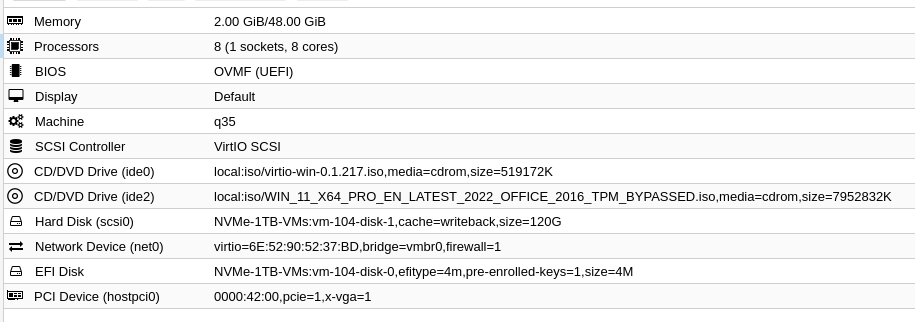Setting up Proxmox on R720
- Plan is to have server run Proxmox, with TrueNAS
- TrueNAS will get HDD passthrough, hence Flash IT Mode Firmware to H710P
- all proxmox and its
- Get HW
- DVD caddy and an old SSD for Proxmox
- use this, because r720 cannot boot into a PCIe NVMe drive
- NVMe to PCI2 adapter
- Samsung 1tb NVMe
- for all VM
- GPU Powercable for nVidia card
- DVD caddy and an old SSD for Proxmox
- relatively simple installation of proxmox
- plug in USB with latest proxmox ISO
- boot up and select boot device with use UEFI boot
- install, follow prompts. pretty straightforward prompts
- I setup mine with static IP
- wont be able to boot directly into NVMe PCIe
- possible alternatives - use clover, or change DVD drive to ssd bay
- Super Helper post to get started with Proxmox
- enabled GPU Passthrough
- changed
/etc/default/grupto have the following lineGRUB_CMDLINE_LINUX_DEFAULT="quiet intel_iommu=on"- This was later updated to
"quiet intel_iommu=on iommu=pt pci=noaer initcall_backlist=sysfb_initto help resolve pass two differen nvidia cards into two different VM
- This was later updated to
- then run
update-grub
- edited
/etc/modprobe.d/vfio.confoptions vfio-pci ids=<add all your device ids here separated by commas - added to
/etc/modulesvfio vfio_iommu_type1 vfio_pci vfio_virqfd- ran
update-initramfs -u -k all - then
reboot
- ran
- when adding a new VM, have the following settings
- BIOS settings
q35for machine typeovmffor boot type
- Add PCIE hardware.. pick your GPU from list
- BIOS settings
- debugging why its not working, look at these files and settings
cat /etc/default/grubcat /etc/moduleslsmod | grep vfiocat /proc/cmdlinedmesg | grep -E 'IOMMU|DMAR'find /sys/kernel/iommu_groups/ -type llspci
- changed
Checklist to #
- enabling updates
- by updating source list for debian, were using proxmox 7 and it is based off of Debian Bulleye
deb http://download.proxmox.com/debian/pve bullseye pve-no-subscription- NOTE: to update this, if you are using any other version other than 7.x.x
- comment out enterprise apt source in
/etc/apt/sources.list.d/pve-enterprise.list- prevent updating issues
- run
apt update,apt dist-upgrade,reboot - this will get proxmox updated using all the new sources
- by updating source list for debian, were using proxmox 7 and it is based off of Debian Bulleye
- optional. configure storage, and run
fdisk /dev/sdXXXto clear out the disks that are avail- were gonna pass HDD to TrueNAS, so we’ll only have one drive. that is the Samsung 1Tb drive for all the OS
- update DNS in
/etc/resolve.confto point to home server DNS
root@beast:~# cat /etc/resolv.conf
search nameserver
nameserver 10.1.10.1
nameserver 127.0.0.1
root@beast:~#
- plug in dummy HDMI
- Disable secured boot
- enable IOMMU - for GPU passthrough
Installing Windows #
- reinstalled windows, for a main dev machine. mainly fusion 360
- install without a problem, keys things to remember to setup from the GET GO is UEFI + without UEFI, Q35 machine. We wont able to do GPU passthrough

- install without a problem, keys things to remember to setup from the GET GO is UEFI + without UEFI, Q35 machine. We wont able to do GPU passthrough
Backup and Restore Proxmox #
NOTE: this can only be done on the same hardware!!!!
- Mount UBS Drive for Proxmox Backup · GitHub
a. Formatted the entire disk with
mkfs.ext4 /dev/sdbfor the entire disk, and not just the partition - backup and restore script GitHub - huynle/proxmox-stuff: This is a collection of stuff that I wrote for Proxmox.
- setup monthly cronjob, by putting the script in
/etc/cron.monthly/

Troubleshoot #
- lose qemu guest agent and network connectivity after a little time with PCI Nvidia card added
- most likely a kernel and nvidia firmware compatibility issue - look here






